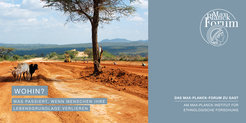Panel discussion – Loss of home and displacement: global causes
The Max Planck Institute for Social Anthropology will host a panel discussion on Tuesday, 14 November 2017 on the topic of flight and displacement. Titled “Wohin? Was passiert, wenn Menschen ihre Lebensgrundlage verlieren”, the event, which will take place in German, will feature short presentations of ethnographic case studies by seven researchers, followed by a discussion in which they will take questions from the audience. The event is open to the public but registration is requested. To register, please e-mail forum@gv.mpg.de or call 089 2108-1668.

Using ethnography to understand movement of people
Due to appropriation of land for industrial agriculture or surface mining, due to military violence, or due to actions of the state or non-state groups (including terrorists) who act like states, many people are being forced to abandon their livelihoods and homes and depart for new lands – often without knowing where they will go or what will happen to them. “Ethnographic case studies give a voice to these people and enable us to become familiar with their experiences and better understand their thoughts and actions”, explains Prof. Dr. Günther Schlee, Director of the Department ‘Integration and Conflict’ at the Max Planck Institute for Social Anthropology. “When we talk about people losing their ‘basis for existence’, we mean not just material matters such as access to land and water, but also the conditions that allow them to maintain their human dignity.” Often the two are related – for example, when people are expelled from a region as a consequence of violations of their human rights. And once they arrive in a new land, physical survival and the regaining of personal integrity are inextricably linked parts of the process of reorientation.
Land grabbing by foreign actors
The seven case studies reflect the diversity of situations that can lead to leaving one’s home. The example of the villages Breunsdorf and Heuersdorf south of Leipzig, which were displaced for brown coal mining, is representative of a phenomenon that can be found nearly everywhere in the world: the forced relocation of certain populations in the name of large-scale industrial or agricultural development projects. The effect of such displacements is particularly severe when there is a failure to observe legal rights and due process, as often happens in many countries outside Europe. The production of goods consumed in the Global North – sugar cane, biofuels, cut flowers, furniture, or palm oil – is often connected with massive land grabbing in the Global South, where people must give up their land and property to international investors. Sometimes they are even forced to leave by violent means.
Fleeing terrorism – or remaining
Terrorism is one of the most common reasons why people flee their homeland. But not everyone is able to flee. As a case study on the armed conflicts in Iraq and Syria shows, the decision not to flee is sometimes a rational choice: rather than passively submitting to the perpetrators of violence, some may actively cooperate in an attempt to protect their own interests. Aligning themselves with armed groups provides civilians with chance to remain in their residences and preserve some measure of existential and economic security. But by adopting this attitude towards armed groups, these individuals become part of an alliance that harbours risks of its own and contributes to the further expansion of extremism.
Persecution under rule of law
“However, we don’t want to focus solely on crisis regions”, notes Prof. Dr. Marie-Claire Foblets, Managing Director of the Max Planck Institute for Social Anthropology. “Displacement can occur for other reasons, too. We also look, for example, at the emigration of the Twelve Tribes Christian community that was established in Germany in the 1990s. They came into conflict with the German government’s strict definition of child welfare, which denied them the right to raise their children in the manner they considered appropriate.” In 2016 the community decided to move to the Czech Republic because they did not feel that in Germany they could live in dignity in accordance with their religious beliefs.
The Max Planck Forum
The Max Planck Forum is a regular series of events launched by the Max Planck Society. During these panel discussions, researchers debate current political, economic and social issues with interested members of the public. The forum is an established and highly successful feature in Berlin and Munich and will now be held for the first time at the Max Planck Institute for Social Anthropology in Halle (Saale).
Studying global social change
The Max Planck Institute for Social Anthropology is one of the world’s leading centres for research in socio-cultural anthropology. It was established in 1999 by Chris Hann and Günther Schlee, and moved to its permanent buildings at Advokatenweg 36 in Halle/Saale in 2001. Marie-Claire Foblets joined the Institute as Director of the department ‘Law & Anthropology’ in 2012.
Common to all research projects at the Max Planck Institute is the comparative analysis of social change; it is primarily in this domain that its researchers contribute to anthropological theory, though many programmes also have applied significance and political topicality. Fieldwork is an essential part of almost all projects. Some 175 researchers from over 30 countries currently work at the Institute. In addition, the Institute also hosts countless guest researchers who join in the scholarly discussions.
Contact for this press release
Prof. Dr. Günther Schlee
Director – Department 'Integration and Conflict'
Max Planck Institute for Social Anthropology
Advokatenweg 36, 06114 Halle (Saale)
Tel.: 0345 2927-101
Mail: schlee@eth.mpg.de
http://www.eth.mpg.de/schlee
PR contact
Stefan Schwendtner
Press and Public Relations
Max Planck Institute for Social Anthropology
Advokatenweg 36, 06114 Halle (Saale)
Tel.: 0345 2927-425
Mail: schwendtner@eth.mpg.de
http://www.eth.mpg.de
